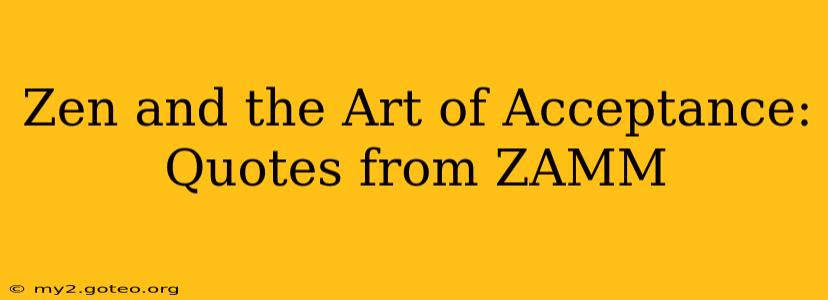The ZAMM (Zen and the Art of Motorcycle Maintenance) book, though not explicitly a collection of Zen quotes, subtly weaves profound philosophical reflections on acceptance interwoven with practical advice on motorcycle maintenance. It explores the relationship between quality, technology, and the human spirit, offering a unique lens through which to understand the concept of acceptance in life. While Robert Pirsig doesn't directly quote Zen masters, his narrative provides ample material for exploring the Zen principles of acceptance through insightful observations and metaphors. This article will delve into some key themes and ideas from ZAMM that resonate with the spirit of Zen acceptance, exploring what Pirsig’s work teaches us about embracing the present moment.
What is the Core Message of ZAMM Regarding Acceptance?
ZAMM’s core message about acceptance hinges on embracing the duality of the world—the clash between the romantic and the classical, the intuitive and the technical. Pirsig champions a holistic understanding of reality that transcends simplistic dichotomies. Acceptance, in this context, means acknowledging the complexities and contradictions of life without judgment. It's about finding peace in the midst of chaos and understanding that imperfection is inherent in the process. This parallels the Zen concept of mushin, a state of mind free from self-consciousness and judgment.
How Does ZAMM Teach Us to Accept Imperfection?
Pirsig's meticulous descriptions of motorcycle maintenance serve as a powerful metaphor for life itself. Repairing a motorcycle is rarely straightforward; it demands patience, attention to detail, and the acceptance of unforeseen challenges. When things go wrong, as they inevitably do, the Zen-like approach advocated by ZAMM is to accept the situation, troubleshoot the problem methodically, and learn from the experience rather than being overcome by frustration. This acceptance of imperfection mirrors the Zen principle of wabi-sabi, which finds beauty in imperfection and impermanence.
How Does ZAMM's Philosophy on Quality Relate to Acceptance?
The concept of "Quality" is central to ZAMM. Pirsig suggests that Quality is an inherent, undefinable yet perceivable aspect of reality. Accepting Quality means embracing the subjective and intuitive alongside the objective and rational. This necessitates an acceptance of ambiguity and uncertainty. We can't always define or fully comprehend Quality, but we can experience it and learn to appreciate its presence in even the most mundane aspects of life. This acceptance of the undefinable is a key element in many Zen teachings.
Does ZAMM Directly Quote Zen Masters or Teachings?
No, ZAMM doesn't directly quote Zen masters or explicitly detail specific Zen teachings. Pirsig's philosophy, while deeply resonant with Zen principles, is developed independently. The parallels between his ideas and Zen Buddhism are more implicit than explicit, offering a unique and personal interpretation of these core tenets. His focus is on lived experience and the practical application of philosophical concepts rather than academic analysis of established religious texts.
What are Some Key Takeaways from ZAMM about Acceptance?
- Embrace the Process: The journey itself, with its challenges and triumphs, is as important as the destination. Acceptance of the process allows for a more fulfilling and enriching experience.
- Let Go of Control: Life is full of surprises, both pleasant and unpleasant. Accepting that we cannot control everything fosters a sense of peace and resilience.
- Find Meaning in the Mundane: Even the seemingly insignificant tasks and events hold potential for growth and learning. Accepting these moments with mindfulness can lead to deeper appreciation.
- Embrace Imperfection: Perfection is an illusion. Accepting imperfection allows us to appreciate the beauty of imperfection and the unique qualities of each experience.
- Live in the Present Moment: Dwelling on the past or worrying about the future hinders our ability to appreciate the present moment. Acceptance of the present moment is essential for peace of mind.
ZAMM, while not a treatise on Zen Buddhism, offers a powerful and deeply relatable narrative that encourages acceptance as a path to a more fulfilling life. Its exploration of Quality, the process of motorcycle maintenance, and the journey of self-discovery provides a rich framework for understanding the Zen-like approach to living in the present moment and embracing the inevitable complexities of life. Through its evocative prose and insightful observations, ZAMM encourages readers to develop a mindset of acceptance, finding peace in the midst of the challenges and imperfections that inevitably shape our lives.

